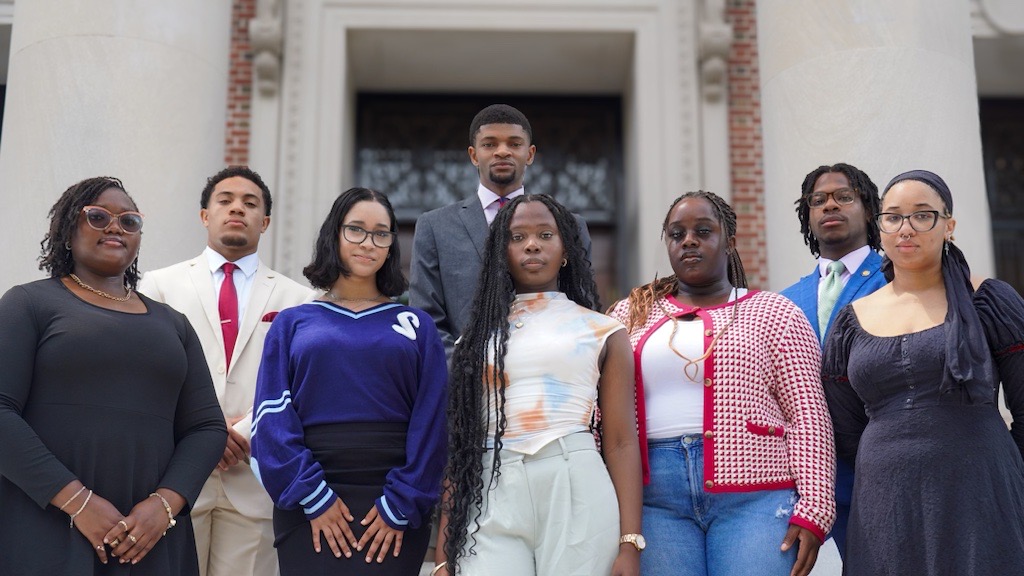Harvard & the Legacy of Slavery Initiative looks to build on partnerships with HBCUs and Boston, Cambridge organizations

Du Bois Scholars Kohl Crawford, Jaden Seay, and Ellison Richardson (back row). Oluwatomisin Salami, Ana Villavasso, Manuela Niamke, Esohe Edomwandagbon, and Anayla McClendon (front row). Photo by Sabrina Debrosse/Harvard College.
“Transformational” and “growth-oriented.” These are just two descriptions members of the Du Bois Scholars Program used to summarize their experience.
This summer, 20 rising college juniors and seniors from 12 Historically Black Colleges and Universities (HBCUs) joined Harvard College’s Summer Undergraduate Research Village as the first cohort of the Du Bois Scholars Program. Funded by Harvard College and the Harvard & the Legacy of Slavery (H&LS) Initiative, the Du Bois Scholars Program gets its name from the University’s first Black Ph.D. graduate, W.E.B. Du Bois. The program enables HBCU scholars to pursue rigorous research and engage with learning environments that foster intellectual growth and personal development.
“There is no way you can leave this experience the same as you came in. My time working in the lab has allowed me to work with other people, and I think that was the biggest thing that I wanted out of this experience — to not do it by myself,” said Evan Spann, a Du Bois Scholar and rising junior at Morehouse College, who studies psychology. Spann’s research at Harvard this summer focused on environmental health disparities in Chelsea and Dorchester.
“It’s important to be surrounded by other HBCU students in this cohort because each of us brings our own genius, our own light to the group,” Spann said.
The Du Bois Scholars were paired with Harvard faculty mentors to conduct research over nine weeks. At the end of the term, they presented their research and reflected on what they had learned.
“The rigorous academic environment of the Du Bois Scholars Program and emphasis on leadership have bolstered my confidence and sharpened my critical thinking skills,” said Yasmeen Olass, a Du Bois Scholar and a junior studying biochemistry at Delaware State University.
Rita Hamad, associate professor of social and behavioral sciences, who served as a faculty mentor, said she could see how the Du Bois Scholars impacted the research in her area.
“At the [Social Policies for Health Equity Research] Center, we study a lot about health equity and the roots of structural racism and other social and economic factors and how they affect health. This program gets at that, and it really is trying to address the root causes of inequities in academia more generally,” Hamad said.
In addition to the Du Bois Scholars Program, H&LS recently launched several other partnerships with HBCUs.
View the inaugural Du Bois Scholars summer highlight video here.




